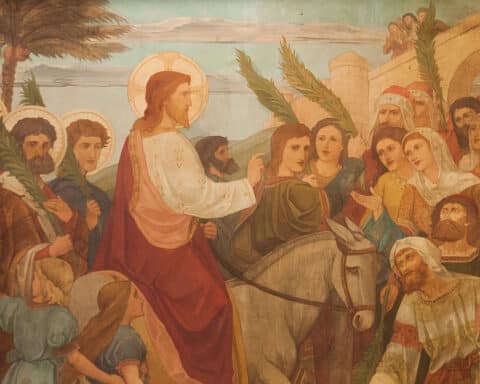On the Third Sunday of Advent, God gives us space to rejoice. Gaudete Sunday gets its name in Latin from the opening antiphons, taken from St. Paul’s letter to the Philippians, “Rejoice (Gaudete) in the Lord always. I shall say it again: rejoice! … The Lord is near” (Phil 4:4-5).
The nearness of God is foretold by the prophet Zephaniah. In the words of the prophet, we discover the promise of a divine Bridegroom who has at last come to his beloved Israel.
There will be no more judgment.
There will be no more weeping.
There will be no more waiting.
For this Bridegroom God has come and “will rejoice over you with gladness, and renew you in his love, Who will sing joyfully because of you, as on festival days” (Zep 3:17-18). It’s time to feast.
This is in stark contrast to the words of John the Baptist.
| Third Sunday of Advent – December 16 |
|---|
|
ZEP 3:14-18A
IS 12:2-3, 4, 5-6
PHIL 4:4-7
LK 3:10-18
|
This last of the prophets finds himself teaching crowds, just as Jesus will do later in the Gospel of Luke. The crowds want to know how to act in light of John the Baptist’s announcement that the kingdom of God is at hand.
John doesn’t tell them to rejoice.
He tells them to give away one of their two cloaks. Share food. If you’re a tax collector, participating in an unjust regime, stop collecting money. If you’re a soldier, don’t exhort.
The crowd pushes on, wanting to know if John the Baptist is the Messiah. Is he the great king, the one who has come to redeem Israel?
John tells them no and promises them one who is to come. He will be mightier. He will baptize with the Holy Spirit. He will enact the great judgment.
And this, dear friends, is the Good News.
If John the Baptist has come to announce the last of days, he is doing so in a way very different from Zephaniah.
There is no foretelling of a wedding feast, but an occasion of fasting. God’s judgment is at hand. And it’s time to prepare. A strange rejoicing indeed.
How can something like divine judgment lead us to rejoice? Shouldn’t we be trembling in fear?
Yet, maybe our reaction to this divine judgment is the problem. The kingdom of this age is not always the kingdom of God.
It is the kingdom where the rich profit off the poor.
It is the kingdom where the powerful crush the weak.
With the coming of Jesus Christ, it’s this kingdom that will be under judgment.
If we’re hesitant to rejoice at this fact, it may be because we’re the ones at fault. We’re the rich, the powerful and the mighty.
The Good News is that we can, during the remaining days of Advent, prepare our hearts to rejoice in the coming of this kingdom.
We should, as St. Paul tells us, let our gentleness be known to all. We should approach God not as one who is complete, who has achieved perfect peace on our own, but as one longing for God.
The Third Sunday of Advent is “good news” because there is still time. There’s time to feed the hungry, fast and call out in prayer before the living God.
To learn to rejoice in the coming of Christ’s kingdom. The kingdom where glad tidings shall be brought to the poor (cf. Is 61:1), not the powerful and the haughty.
So, it is time to rejoice! Not because the feast is here.
But because the Bridegroom has given us just a bit more time to prepare.
Timothy P. O’Malley, Ph.D., is managing director of the McGrath Institute for Church Life.





